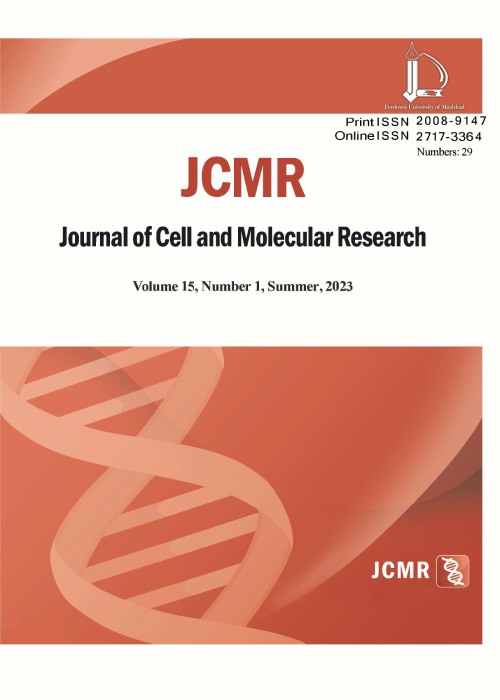Phytochemical Analysis of Volatile and Non-volatile Fractions, Antioxidant, and Anti-Cancer Activities of Dracocephalum polychaetum and Dracocephalum kotschyi
Author(s):
Article Type:
Research/Original Article (دارای رتبه معتبر)
Abstract:
The present study was conducted to determine the volatile and non-volatile fractions and the antioxidant and anti-cancer activities of ethanolic extracts of Dracocephalum polychaetum and D. kotschyi. The volatile and non-volatile fractions were investigated by gas chromatography-mass spectrometry (GC-MS) and high-performance liquid chromatography (HPLC). The cytotoxicity effect of two ethanol extracts and the major phenolic components has been evaluated on breast and colon cancer cells by the MMT assay. GC-MS of the essential oils identified about 50 compounds, and perillylaldehyde and D-limonene were the main constituents in the essential oils of the two species. Moreover, high-performance liquid chromatography- Diode array detector analysis demonstrated that the ethanolic extract of D. polychaetum and D. kotschyi were the source of phenolic compounds such as rosmarinic acid, protocatechuic acid, naringin, apigenin, syringic acid, epicatechin, chlorogenic acid, thymol, carvacrol, rutin, p-coumaric acid, gallic acid, benzoic acid, cinnamic acid, resorcinol, quercetin, salicylic acid, 4-hydroxybenzoic acid, and ferulic acid. Rosmarinic acid and thymol were the main predominant phenolic constituents in D. kotschyi and D. polychaetum ethanolic extracts. The cytotoxicity effect of D. kotschyi and D. polychaetum ethanol extracts and the major phenolic components including rosmarinic acid, thymol, apigenin, quercetin, and nariginin has been evaluated on breast and colon cancer cells by MMT assay and results indicated IC50 values in the range of 90 to 140 (µg.ml-1) after 48 hours of treatment with ethanol extracts. Among phenolic components, thymol caused the lowest cell viability and Narengin showed the lowest anti-proliferative activity. Both extracts also showed antioxidant activity using DPPH assay. The findings of this research suggest that the Dracocephalum have precious bioactive and natural compounds with significant antioxidant and in vitro anti-cancer activities.
Keywords:
Language:
English
Published:
Journal of Cell and Molecular Research, Volume:14 Issue: 1, Summer and Autumn 2022
Pages:
11 to 19
magiran.com/p2507095
دانلود و مطالعه متن این مقاله با یکی از روشهای زیر امکان پذیر است:
اشتراک شخصی
با عضویت و پرداخت آنلاین حق اشتراک یکساله به مبلغ 1,390,000ريال میتوانید 70 عنوان مطلب دانلود کنید!
اشتراک سازمانی
به کتابخانه دانشگاه یا محل کار خود پیشنهاد کنید تا اشتراک سازمانی این پایگاه را برای دسترسی نامحدود همه کاربران به متن مطالب تهیه نمایند!
توجه!
- حق عضویت دریافتی صرف حمایت از نشریات عضو و نگهداری، تکمیل و توسعه مگیران میشود.
- پرداخت حق اشتراک و دانلود مقالات اجازه بازنشر آن در سایر رسانههای چاپی و دیجیتال را به کاربر نمیدهد.
In order to view content subscription is required
Personal subscription
Subscribe magiran.com for 70 € euros via PayPal and download 70 articles during a year.
Organization subscription
Please contact us to subscribe your university or library for unlimited access!


